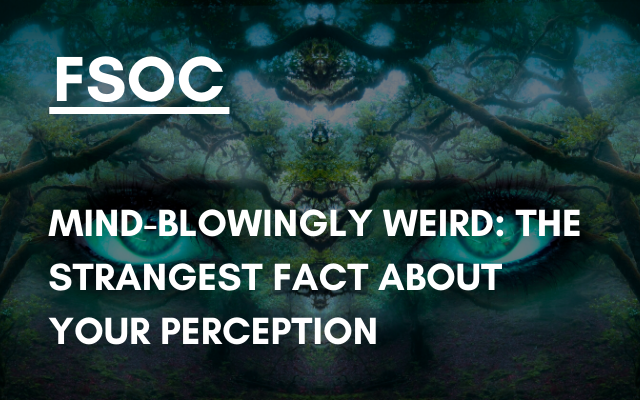FSOC – Mind-blowingly weird: the strangest fact about your perception
Released on September 27th, 2019
Have you ever said, “I know it’s just my thinking, but…”?
This week’s FSOC is what I point people to when they say that, or when they ask me, “What the difference is between thoughts, thinking and the *principle* of Thought?”
A few years ago, I was answering a question from one of my Clarity Certification Training clients and came up with a metaphor to describe the principles behind clarity, and how they create our perception. You can listen to the 8-minute audio recording of that here.
What I’m pointing to (metaphorically) in this audio is one of the most unexpected and counter-intuitive facts about perception, first discovered in 1852 by Hermann Helmholtz. Here’s an excerpt from the fascinating book, “Making Up The Mind: How the Brain Creates our Mental World” by Chris Frith (Blackwell Publishing ©Chris Frith 2007):
As a young research student, Hermann Helmholtz was told by his professor that it would be impossible to measure the speed of nerve conduction. It would be too fast. But, like all good students, he ignored this advice. In 1852 he was able to measure the speed of nerve conduction and showed that it was rather slow. In sensory neurons it takes about 20 msec for the nerve impulse to travel 1 meter. Helmholtz also measured “perception time” by asking people to press a button as soon as they felt a touch on various parts of the body. These reactions times turned out to be even longer, being more than 100 msec. These observations show that our perception of objects in the outside world is not immediate. Helmholtz realized that various processes must be occurring in the brain before a representation of an object in the outside world appears in the mind. He proposed that perception of the world was not direct, but depended on “unconscious inferences.” In other words before we can perceive an object the brain has to infer what the object might be on the basis of the information reaching the senses.
This “strange but true” fact of our perception is utterly counter to how our perception of reality typically seems. Whenever I catch a glimpse of it, I’m struck afresh by how extraordinary this fact is. As such, it is worthy of reflection and wonder. I encourage you to listen to this short audio (less than 9 minutes) several times. Enjoy!
To your increasing clarity,
Big love
Jamie
Jamie Smart, Sunday Times Bestselling Author, Speaker and Executive Coach
